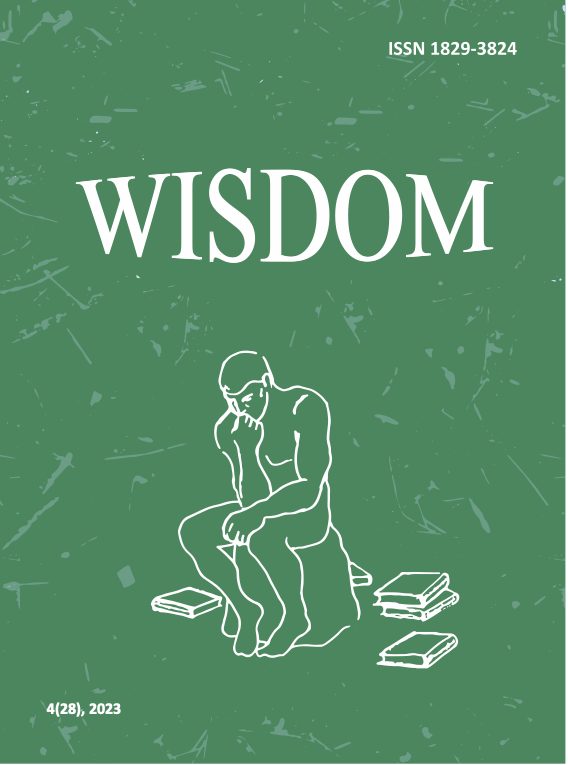Speculative Whole Revised
DOI:
https://doi.org/10.24234/wisdom.v25i1.963Keywords:
speculative philosophy, the Whole, D. P. Verene, reflection, virtual, integrity, supplementationAbstract
How to think of the Whole? Our theoretical findings on that matter emanate from the critical response to D. F. Verene’s account of the idea of the Whole, which is speculative and necessary for true philosophy. As this study shows, the idea in its essence depends upon two main criteria, ontological and epistemological. Both criteria perfectly demonstrate the logic of supplementation, which undermines the original conception. We argue that the speculative Whole has to be revisited. First, the only possibility to provide the connection between the idea of the Whole and self-knowledge in a consistent way could be given through the idea of holistic living. Secondly, the Whole must be thought virtual: that allows the Whole to exist in a variety of drafts, exclusive of the one true. Both our theoretical gestures result in a significant convergence of the concepts of the Whole and Becoming.
Downloads
References
Bauman, Z. (2002). Identity in the globalizing world. In E. Ben-Rafael, & Y. Sternberg (Eds.), Identity, culture and globalization (pp. 471-482). Boston: Brill. DOI: https://doi.org/10.1163/9789004475618_035
Muravev, A. N. (2017). Filosofskoe uchenie G. V. Leibnitsa v otsenke G. V. F. Gegelia (Philosophi-cal doctrine of G. W. Leibniz considered by G. W. F. Hegel, in Russian). Moscow Univer-sity Bulletin. Series 7. Philosophy, 4, 93-100.
Rorty, R. (1979). Philosophy and the mirror of nature. Princeton: Princeton University Press.
Sloterdijk, P. (1988). Critique of cynical reason. Minneapolis: University of Minnesota Press.
Solozhenkin, B. S. (2019). Osnovnye poniatiia bioetiki v ikh filosofsko-antropologicheskoi perspek-tive: o dialektike zhizni i smerti (Basic concepts of bioethics in their philosophical and an-thropological perspective: On the dialectics of life and death, in Russian). In A. V. Grekhov, & A. N. Fatenkov (Eds.), Sotsialno-gumanitarnoe poznanie: metodologicheskie i soderzhatelnye paralleli (Social and humanitarian cognition: methodological and substan-tive parallels, in Russian) (pp. 245-262). Moscow: Akvilon.
Solozhenkin, B. S., & Smirnov D. V. (2019). Is imagination fundamental? On the issue of the gene-sis of subjectivity. International Journal of Engineering and Advanced Technology, 9(1), 5081-5085. doi: 10.35940/ijeat.A2145.109119 DOI: https://doi.org/10.35940/ijeat.A2145.109119
Verene, D. P. (1997). Philosophy and the return to self-knowledge. New Haven: Yale University Press.
Verene, D. P. (2007). Hegel's absolute: An introduction to reading the phenomenology of spirit. Albany: State University of New York Press.
Verene, D. P. (2009). Speculative philosophy. Lanham: Lexington Books.
Zagzebski, L. (2004). Divine motivation theory. New York: Cambridge University Press. DOI: https://doi.org/10.1017/CBO9780511606823
Downloads
Published
How to Cite
Issue
Section
License
Copyright (c) 2023 Boris SOLOZHENKIN, Dmitry SMIRNOV

This work is licensed under a Creative Commons Attribution-NonCommercial 4.0 International License.
Creative Commons Attribution-Non-Commercial (CC BY-NC). CC BY-NC allows users to copy and distribute the article, provided this is not done for commercial purposes. The users may adapt – remix, transform, and build upon the material giving appropriate credit, and providing a link to the license. The full details of the license are available at https://creativecommons.org/licenses/by-nc/4.0/.















